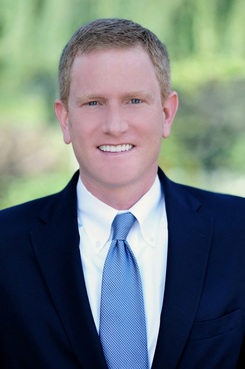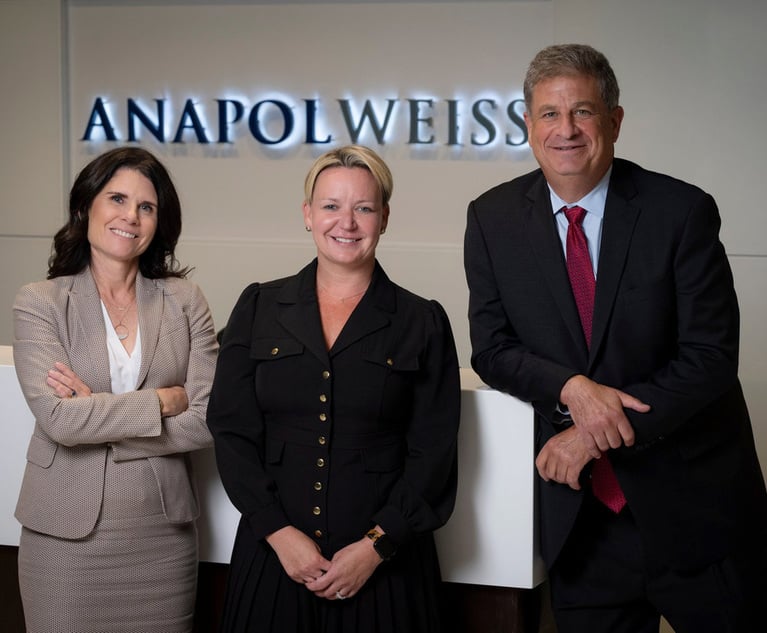This Silicon Valley Litigator Wants to Disrupt Big Law's Business Model
"If you are only looking for a 'master of the universe,' the white man with a certain look, you are going to be very limited in your ability to attract, retain and encourage the best talent," said Courtland Reichman.
October 19, 2018 at 03:59 PM
7 minute read
 Courtland Reichman
Courtland Reichman
Courtland Reichman, a former King & Spalding partner who made waves earlier this week when he led a 13-lawyer team breaking away from McKool Smith to form a bicoastal litigation boutique, wants to shake up the traditional Big Law business model.
Reichman Jorgensen, co-founded by Reichman himself and former McKool Smith partner Sarah Jorgensen, will focus exclusively on complex commercial litigation and patent cases. The new firm plans to do so by eschewing the billable hour and compensating associates on a pay scale greater than the one set this summer by Cravath, Swaine & Moore and Milbank, Tweed, Hadley & McCloy.
With seven partners and offices in Atlanta, New York and Silicon Valley, Reichman Jorgensen wants to challenge its Big Law competitors by adopting innovative alternative fee structures and eliminating the partnership track and lockstep compensation system.
Reichman Jorgensen's name partners are longtime friends and colleagues. During the 18 years that Reichman and Jorgensen worked together at McKool Smith and King & Spalding, the latter of which they left in 2012 to join their now former firm, the duo came up with their own vision for billing, client case management, compensation, fees and recruiting.
The Recorder caught up with Reichman, a veteran of many high-profile disputes, to discuss the philosophy and strategy for his new firm, as well as broader trends in the Big Law space.
TR: Why launch Reichman Jorgensen?
Reichman: We decided it was time to try and see if we can build something special, doing it in a way where we get to start from scratch, as opposed to being part of the larger environment. I came from King & Spalding and McKool Smith, which are two established firms that have a structure and way of doing things. You have a range of policies and practices and big firms are more limited in their ability to decide what types of cases to take in, how to represent clients and what the fee structure and recruiting could be, all these different things that really matter. We have a way of representing clients that we really like, a way of creating and fostering creativity and excitement about being a trial lawyer.
What inspired you to do things differently, like eliminate the billable hour?
There were two things critical to creating this platform. One is not being at odds with your clients over billable hours. Most lawyers hate billable hours because it kills your spirit. But you need to have the very smartest people from the best law schools and clerkships working with you. If you combine these two, it is almost like magic because now you are not being rewarded for being slow. [At most large law firms,] a slow associate is more profitable than the smartest and fastest associate. The smarter one feels the lack of energy and excitement about their work because their is no advantage to being super-efficient and getting it done. The only advantage is being slow. If you do things quickly, you just get more work because you still have to hit those 200 hours a month, no matter what you do. We want to energize lawyers and unleash them.
What do you hope to gain by paying associates more than Cravath?
We are trying to break the mold. Cravath, however, is actually not at the top of the market. There are a handful of elite, smaller and litigation-focused firms that are there. It is no surprise that they end up getting the best recruits, people from the U.S. Supreme Court and other prestigious clerkships. It makes a big difference—smart people win cases—and it's that simple. If you want the best talent you have to be competitive with those firms or you can't recruit the best and brightest. So it's not about serving associate greed, it's just a function of market reality.
What qualities does a successful job candidate bring to your firm?
We believe that talent wins cases. Period. The first thing you have to do is be competitive. The second is tied to the first thing we talked about, which is creating an environment that allows unique talent to thrive. Part of that is embracing diversity and a thoughtful approach, because a lot of your best talent is going to be extremely independent. If you are only looking for a 'master of the universe,' the white man with a certain look, you are going to be very limited in your ability to attract, retain and encourage the best talent. You need people who think differently but have the right academic credentials. That creates an electrifying environment where everybody is challenging each other, coming up with great ideas and not trying to just be focused all day on billing hours. We want to solve clients' problems.
What is a flexible work culture? Is having that a necessity for lawyers?
I've found there is an increased desire to be able to work when and how you need to, some of which of course is borne out of being in the Bay Area. If you have to be in the office by 8 a.m., you might have a two-hour commute, but if you can get to the office by 10:30 a.m., it might be a 20-minute commute. In order to attract people from all over, we decided to have a flexible work schedule. We are all expected to be plugged in each morning, but what's the difference if you do it from home? If you're going to be busy writing a brief all day, maybe it's better to just stay home and be productive and get your work done rather than commute.
We realized that if you can show this kind of flexibility, you can get this incredible talent you otherwise wouldn't have access to. Especially with millennials, who value job flexibility. It's not that they're not willing to work extraordinary hard, but they want to work smart in a time and place that allows them to achieve work-life balance. Forcing people to punch the clock in certain locations just is not conducive to recruiting the very best talent.
Do you see more lawyers leaving Big Law behind to control their own destiny?
I do see a trend, I think there's something there. What I've seen is that there are a number of reasons to be at a larger firm, one of which is if your practice needs other practices to be able to best serve clients. If I had an FDA, tax and white-collar practice, I couldn't [form Reichman Jorgensen]. If you don't have enough clients, you might need a firm's brand to get work. These are powerful reasons for staying at a large firm. But there is also a cost to being in those firms.
There is bureaucracy and a slowness in implementing strategy that comes with having to get along with 200 other partners who might have different ideas about what their firm should be. You have to be a team player and compromise on your strategic view to accommodate others. And then there are the conflicts that limit your ability to bring certain cases. Those compromises make sense if what you're getting from a firm outweighs [any downsides], but if you don't need those things, all of a sudden the rationale for being in a big firm disappears and people go and start their own firms. They want the flexibility to develop their own practices.
How do you distinguish your firm with others in the Bay Area?
Silicon Valley is among the most competitive legal markets in the world. There are so many firms out there. But we have experience in trying big cases for clients, we have people from prestigious schools and clerkships and we can offer something unique, like flat fees and no billable hours. We put client interests above our own and figure out ways to service their needs in a transparent way. I've found that to be extremely rare in today's legal market.
All interviews are condensed and edited for style, grammar and clarity.
This content has been archived. It is available through our partners, LexisNexis® and Bloomberg Law.
To view this content, please continue to their sites.
Not a Lexis Subscriber?
Subscribe Now
Not a Bloomberg Law Subscriber?
Subscribe Now
NOT FOR REPRINT
© 2025 ALM Global, LLC, All Rights Reserved. Request academic re-use from www.copyright.com. All other uses, submit a request to [email protected]. For more information visit Asset & Logo Licensing.
You Might Like
View All
Once the LA Fires Are Extinguished, Expect the Litigation to Unfold for Years
5 minute read

Faegre Drinker Adds Three Former Federal Prosecutors From Greenberg Traurig
4 minute read
Anapol Weiss Acquires Boutique Led by Star Litigator Alexandra Walsh
5 minute readTrending Stories
- 1Bribery Case Against Former Lt. Gov. Brian Benjamin Is Dropped
- 2‘Extremely Disturbing’: AI Firms Face Class Action by ‘Taskers’ Exposed to Traumatic Content
- 3State Appeals Court Revives BraunHagey Lawsuit Alleging $4.2M Unlawful Wire to China
- 4Invoking Trump, AG Bonta Reminds Lawyers of Duties to Noncitizens in Plea Dealing
- 522-Count Indictment Is Just the Start of SCOTUSBlog Atty's Legal Problems, Experts Say
Who Got The Work
J. Brugh Lower of Gibbons has entered an appearance for industrial equipment supplier Devco Corporation in a pending trademark infringement lawsuit. The suit, accusing the defendant of selling knock-off Graco products, was filed Dec. 18 in New Jersey District Court by Rivkin Radler on behalf of Graco Inc. and Graco Minnesota. The case, assigned to U.S. District Judge Zahid N. Quraishi, is 3:24-cv-11294, Graco Inc. et al v. Devco Corporation.
Who Got The Work
Rebecca Maller-Stein and Kent A. Yalowitz of Arnold & Porter Kaye Scholer have entered their appearances for Hanaco Venture Capital and its executives, Lior Prosor and David Frankel, in a pending securities lawsuit. The action, filed on Dec. 24 in New York Southern District Court by Zell, Aron & Co. on behalf of Goldeneye Advisors, accuses the defendants of negligently and fraudulently managing the plaintiff's $1 million investment. The case, assigned to U.S. District Judge Vernon S. Broderick, is 1:24-cv-09918, Goldeneye Advisors, LLC v. Hanaco Venture Capital, Ltd. et al.
Who Got The Work
Attorneys from A&O Shearman has stepped in as defense counsel for Toronto-Dominion Bank and other defendants in a pending securities class action. The suit, filed Dec. 11 in New York Southern District Court by Bleichmar Fonti & Auld, accuses the defendants of concealing the bank's 'pervasive' deficiencies in regards to its compliance with the Bank Secrecy Act and the quality of its anti-money laundering controls. The case, assigned to U.S. District Judge Arun Subramanian, is 1:24-cv-09445, Gonzalez v. The Toronto-Dominion Bank et al.
Who Got The Work
Crown Castle International, a Pennsylvania company providing shared communications infrastructure, has turned to Luke D. Wolf of Gordon Rees Scully Mansukhani to fend off a pending breach-of-contract lawsuit. The court action, filed Nov. 25 in Michigan Eastern District Court by Hooper Hathaway PC on behalf of The Town Residences LLC, accuses Crown Castle of failing to transfer approximately $30,000 in utility payments from T-Mobile in breach of a roof-top lease and assignment agreement. The case, assigned to U.S. District Judge Susan K. Declercq, is 2:24-cv-13131, The Town Residences LLC v. T-Mobile US, Inc. et al.
Who Got The Work
Wilfred P. Coronato and Daniel M. Schwartz of McCarter & English have stepped in as defense counsel to Electrolux Home Products Inc. in a pending product liability lawsuit. The court action, filed Nov. 26 in New York Eastern District Court by Poulos Lopiccolo PC and Nagel Rice LLP on behalf of David Stern, alleges that the defendant's refrigerators’ drawers and shelving repeatedly break and fall apart within months after purchase. The case, assigned to U.S. District Judge Joan M. Azrack, is 2:24-cv-08204, Stern v. Electrolux Home Products, Inc.
Featured Firms
Law Offices of Gary Martin Hays & Associates, P.C.
(470) 294-1674
Law Offices of Mark E. Salomone
(857) 444-6468
Smith & Hassler
(713) 739-1250






